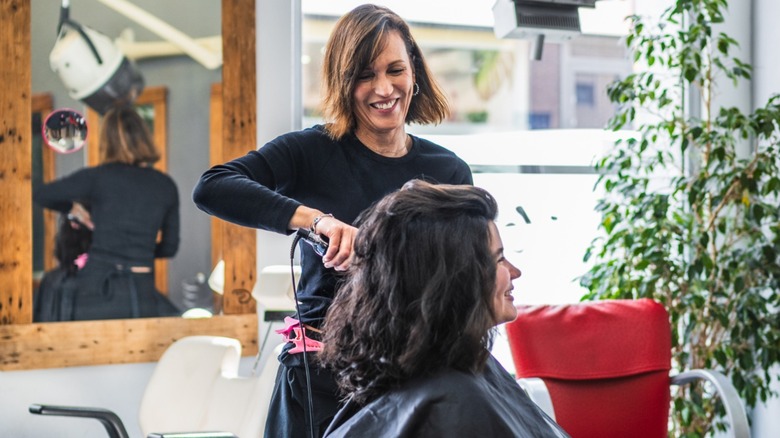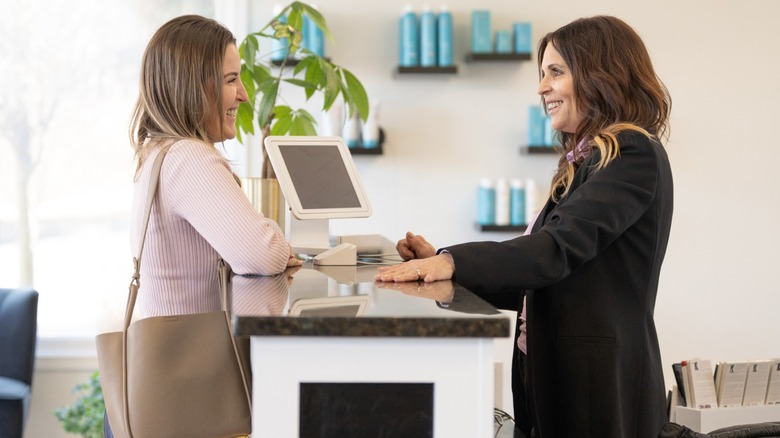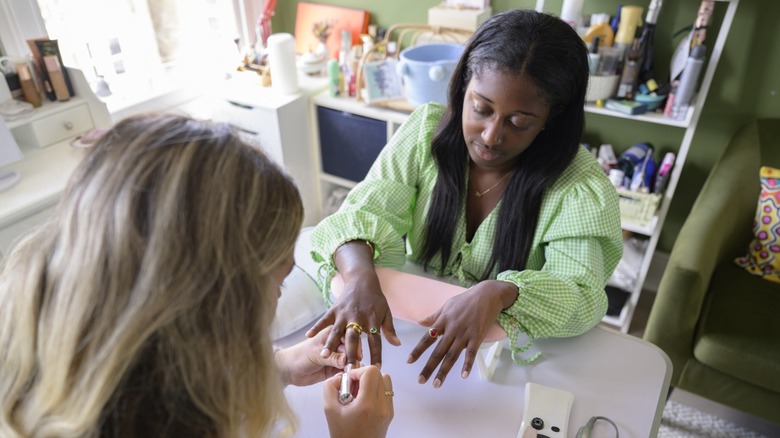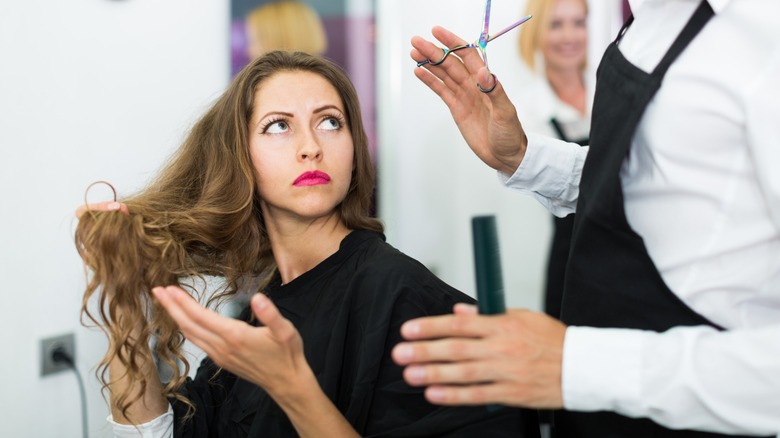5 Salon Etiquette Rules Everybody Should Know
Going to the salon should be an enjoyable experience, so why does it sometimes feel more like a minefield? Learning how to speak up if we don't like how our hair, nails, or makeup looks can be tough, and figuring out how long before an appointment time to arrive can be confusing. But we can help.
No matter what beauty treatment you're looking for, there are a few things to know before booking your next appointment. To make sure you and your salon worker are getting the most out of your time together and you get exactly what you want, we've rounded up five salon etiquette rules everyone should know. From tipping suggestions to advice on speaking up, read up and get ready to sit (or lie) back and relax the next time you book a treatment.
Be on time (but don't be too early)
Though sometimes unavoidable, being late can come off as rude and affect other people's schedules. That's why it's important to make sure you're always on time for your salon appointments. Many salons book back-to-back treatments, and being even a few minutes late could mean you won't get the full time slot you've paid for. It could also push someone else's appointment back if yours runs over, and that's not fair.
Equally, it's rarely a good idea to arrive too early (unless you're explicitly instructed by your salon to do so). How early is too early will depend on the service you're getting (you may need a few minutes to explain a drastic new haircut you want, for example), but turning up more than 10 minutes before your appointment could cause more issues than you realize. You may unwittingly put pressure on the person taking care of you, as they could feel forced to rush through their previous appointment so they don't keep you waiting. Being too keen could also mean you get in the way, particularly in smaller salons that don't have large waiting rooms to accommodate early arrivals.
Remember to give feedback
Feedback is super important after visiting a salon, regardless of whether you loved or loathed it. If you had a positive experience, a good review (either online or in person to your friends and family) could mean a lot to your salon, particularly if it's a smaller business or new to the scene. Unless there's a strict no-tipping policy, there's no reason why you can't show your appreciation with financial compensation, either. The appropriate amount will depend on your location, the beauty treatment you received, and your financial situation, but 15% to 25% of the total cost is a fair amount for good service.
Even if you didn't have a positive experience, feedback is still important when delivered appropriately. Though you may not want to publicize your negative review if the issues you encountered were honest mistakes, (politely) share your thoughts with the salon after your appointment. If you don't feel comfortable telling the person who helped you, speak to a receptionist. Knowing what went wrong will help them improve and give them the opportunity to provide better service next time.
Be prepared and specific
Whatever you're heading to the salon for, be prepared before you leave the house. What being prepared looks like will depend on your treatment, so it's important to do your research beforehand. If you're getting a spray tan, for example, you may be asked to exfoliate 24 hours or more before your appointment and to steer clear of deodorants or moisturizers, which could hinder results. Not doing the prep won't only affect your treatment, but you'll also risk wasting the salon's time if you need extra time after you arrive.
Another way to be prepared, particularly if you're heading to a hair or nail salon, is to think explicitly about what you want and communicate it concisely and effectively. That may mean bringing example photos of the latest pedicure trends or trendy short haircuts to save time, or having an in-depth discussion with your hair stylist or nail tech before they start, if you have a very specific vision. As Silvia Ferdin, educator coach at Aveda Arts & Science, told Reader's Digest, "Often, a bad cut happens when the client and stylist don't have a clear line of communication." And the same can be said for an unflattering manicure.
Speak up and be honest
We get it. Sometimes, being polite is easier than potentially making things awkward and admitting you don't like your new haircut, mani-pedi, spray tan, makeup application, or whatever you visited the salon for. But lying if you're uncomfortable with how things are going won't help anyone, and not being vocal is one of the supposedly polite hair salon habits hairdressers actually hate. Your salon worker is there to do their best for you, but they can't if they don't know you're not on the same page. "As a makeup artist myself, I can't think of anything worse than someone going home and washing their face rather than telling me they didn't like their makeup and giving me the chance to change it," one makeup artist told Glamour U.K.
If you struggle with being vocal, there are ways to be honest that won't come off as distrusting or rude. "If you are getting nervous, ask a few questions in a calm and curious way," Andrew Carruthers, hairstylist and education director for Sam Villa, recommended to NBC News. If you're in a hair salon, that may mean politely asking your hairstylist to explain why they cut your locks a certain way or applied a particular product. That will help you understand their process or give you the chance to change your mind if things aren't looking how you expected.
By being honest, you're allowing your stylist to rectify their work (and give you what you paid for), and also helping build a rapport. That way, they'll have a better understanding of what you like next time, and they could potentially avoid making the same mistakes on another client.
Only expect the treatment you booked
We've all been at the salon and found unexpected inspo from the person next to us or pictures on the wall. That could be something as simple as adding highlights to a cut and color hair appointment, wanting 3D nail charms (2024's hottest nail trend) applied during a standard nail session, or hoping to add a full body massage to a facial. But, even if you're willing to pay, it's unfair to expect your salon to accommodate your demands on a whim if you didn't ask for it when you booked the appointment.
In many cases, timeslots run tight, and there likely won't be time to do more than you initially asked for. A last-minute change could also put pressure on your salon worker. You may even need someone with a different skillset or different products to do everything you want, and there's a good chance they won't be available on such short notice. We'd recommend calling your salon at least 48 hours before your appointment if you want to make any changes (or however long your salon suggests in their T&Cs). That will allow time to try and accommodate your request, manage your expectations, or move your appointment to a time they can provide everything you're asking for.





